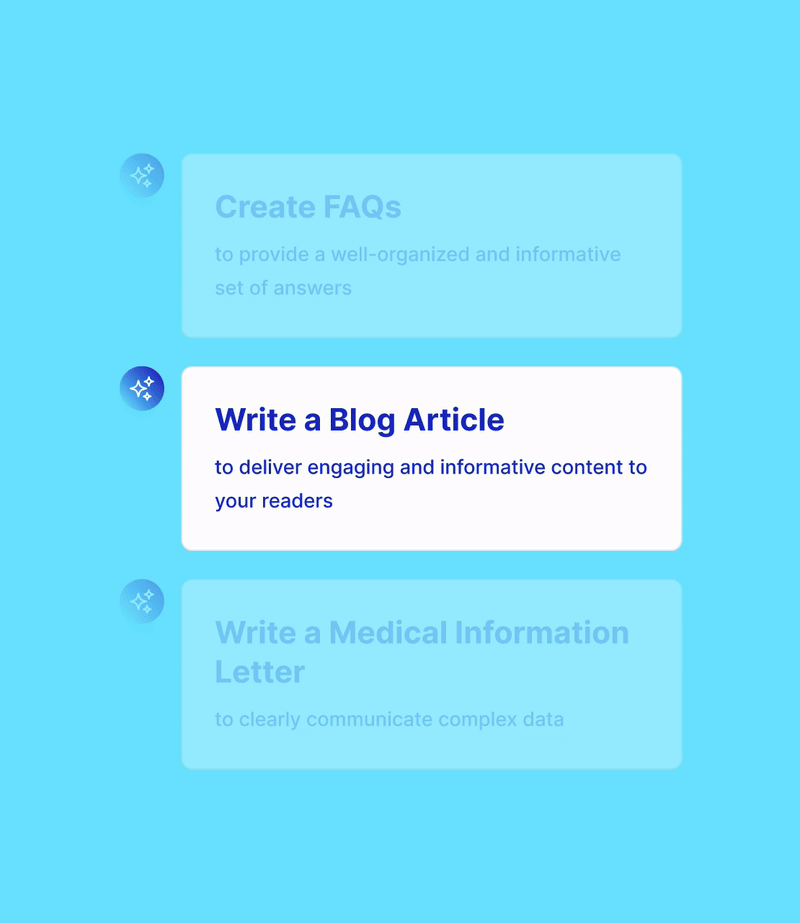Will AI Create New Jobs in the Life Sciences Industry?
AI is transforming the life sciences industry by creating new job opportunities and enhancing efficiency. The market is projected to grow significantly, driven by AI's role in drug discovery and personalized medicine. New roles such as AI-driven drug discovery scientists and genomic data analysts are emerging. Despite AI's capabilities, human expertise remains essential for critical thinking and ethical oversight. Professionals must adapt by upskilling and leveraging AI as a partner. Tools like MACg enhance productivity and support professionals in this evolving field. AI's impact promises a bright future with opportunities for growth and innovation in life sciences.

Artificial intelligence (AI) is no longer just a buzzword; it has become a transformative force reshaping industries across the globe, including life sciences. While concerns about job displacement due to AI persists, the reality offers a more optimistic perspective. AI unlocks opportunities and creates new roles for professionals equipped to harness its potential.
In the life sciences sector, AI improves efficiency and accelerates innovation. It paves the way for a new generation of careers, enabling healthcare, research, and other fields to experience transformative growth.
AI: A Catalyst for New Career Opportunities
The global AI in life sciences market is projected to grow at a compound annual growth rate (CAGR) of 27.9%, reaching $33.5 billion by 2029 (BCC Research.) This rapid expansion reflects the increasing adoption of AI-driven solutions in drug discovery and development, including the rising need for precision medicine and personalized treatment approaches.
AI extends beyond automating routine tasks. It enables breakthroughs in drug discovery, personalized medicine, and medical imaging analysis. AI accelerates drug development by rapidly screening millions of compounds and generating novel drug candidates, potentially reducing the timeline from years to months. The life sciences industry increasingly relies on AI as a cornerstone for progress, with applications ranging from AI-powered prostheses to brain and spinal implants, creating innovative roles to harness its potential.
Exciting New Roles Emerging with AI
The integration of AI into life sciences workflows is reshaping the job market, introducing new roles that emphasize high-value tasks. Examples of these emerging roles include:
AI-Driven Drug Discovery Scientists: These professionals utilize AI algorithms to identify and develop new drug candidates, reducing timelines and costs in drug development.
Genomic Data Analysts: By applying AI to genetic information, these analysts contribute to advancements in personalized medicine and a better understanding of complex diseases.
Biomedical AI Engineers: Engineers in this role design AI-powered medical devices and treatment systems, driving innovation in patient care.
Clinical Trial AI Coordinators: Coordinators leverage AI to optimize the design and execution of clinical trials, improving both efficiency and accuracy.
Regulatory AI Compliance Officers: These specialists ensure that AI-powered solutions meet healthcare regulations, safeguarding the ethical use of AI technologies.
AI-Enabled Bioinformatics Specialists: Specialists in this field develop algorithms to analyze biological data, advancing genomics, proteomics, and related research areas.
The Human Touch in an AI-Powered World
Despite AI’s capabilities, human expertise remains irreplaceable because AI does not possess human critical thinking, ethical oversight, and creativity. AI is an augmenting force, allowing professionals to focus on areas where human skills are indispensable.
Critical Thinking: AI generates insights, but interpreting data and making informed decisions rely on human judgment.
Ethical Oversight: Human involvement ensures compliance with regulations and addresses ethical concerns such as algorithmic bias or data privacy.
Creativity and Innovation: While AI identifies patterns, human ingenuity drives the generation of new hypotheses and groundbreaking solutions.
Adapting to the AI Revolution
As AI solutions redefine the life sciences landscape, adaptability becomes essential for professionals to remain competitive. Thriving in an AI-augmented workplace involves several strategies:
Continuous Upskilling: Developing expertise in AI, data science, and machine learning enhances domain knowledge.
Leveraging AI as a Partner: Tools such as MACg streamline workflows, enabling professionals to allocate more time to strategic tasks.
Focusing on Human Skills: Creativity, problem-solving, and emotional intelligence remain areas where AI cannot replace human input.
Lifelong Learning: Staying informed about AI trends ensures preparedness for evolving industry demands.
MacG: Empowering Professionals in an AI-Driven Future
MacG is among the AI tools that stand out in transforming life sciences. With advanced capabilities, including PubMed search, citation management, and effortless localization, MacG supports professionals in:
-Accelerating literature reviews and summarizing findings.
-Streamlining the creation of regulatory documents, clinical trial reports, and white papers.
-Enabling collaborative efforts across teams while maintaining compliance and ensuring data integrity.
-MACg enhances productivity and supports the delivery of high-quality, impactful work, positioning professionals to succeed in the AI-powered future.
The Future is Bright for Life Sciences Professionals
The rise of AI marks the beginning of a groundbreaking era in life sciences. This transformation leads to advancements in healthcare, innovation in research, and the redefinition of traditional roles. As AI continues to shape the sector, the opportunities for growth and discovery expand, ushering in a new chapter of progress for life sciences professionals.
Additional Resources:
PR Newswire. BCC Research LLC. AI in Life Sciences Market Poised for Explosive Growth with 27.9% CAGR Through 2029. (September 26, 2024.)
Mordor Intelligence. AI in Life Sciences Market Size & Share Analysis - Growth Trends & Forecasts (2024 - 2029)
Harvard Law School. Bill of Health. How Artificial Intelligence is Revolutionizing Drug Discovery. (March 20, 2023.)
Blanco-González A, Cabezón A, Seco-González A, Conde-Torres D, Antelo-Riveiro P, Piñeiro Á, Garcia-Fandino R. The Role of AI in Drug Discovery: Challenges, Opportunities, and Strategies. Pharmaceuticals (Basel). 2023 Jun 18;16(6):891. doi: 10.3390/ph16060891. PMID: 37375838; PMCID: PMC10302890.
Start creating & editing content in minutes with AINGENS' MACg.
Discover all the amazing things you'll create with AI.
